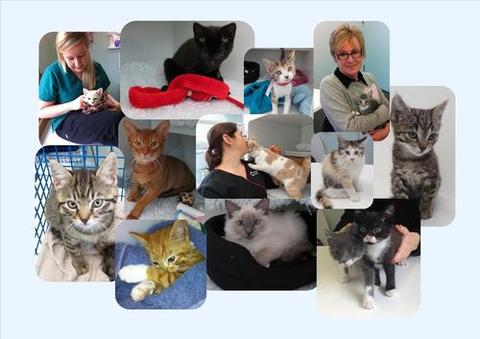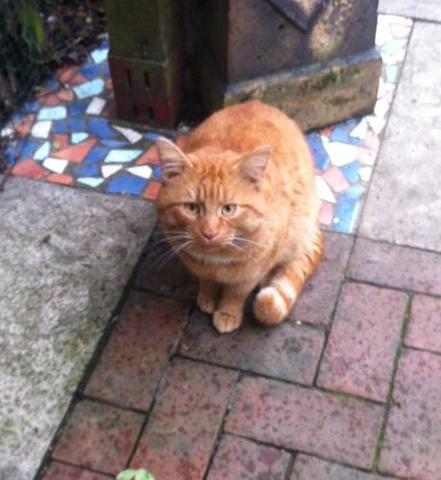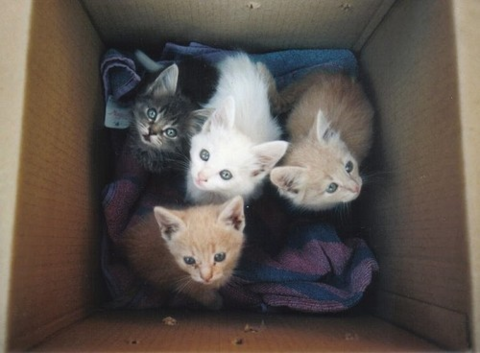 Historically we have fed our pet cats from bowls, but we now understand that this does not meet the cat’s instinctive, natural feeding needs. As humans we naturally want to feed the people and animals that we love, and like to see an empty plate! Just because your cat doesn’t finish their bowl at the first sitting, does not necessarily mean that they don’t like the food. Continue reading
Historically we have fed our pet cats from bowls, but we now understand that this does not meet the cat’s instinctive, natural feeding needs. As humans we naturally want to feed the people and animals that we love, and like to see an empty plate! Just because your cat doesn’t finish their bowl at the first sitting, does not necessarily mean that they don’t like the food. Continue reading
Author Archives: admin
Kitten Season Again!!

The clinic is coming up for its 2nd birthday and I can’t quite believe how many wonderful cats and people we have met so far. As is now becoming a tradition, we would love to see as many friends, old and new at our May open day. As usual, cake, tea, family fun and cat information will be available from 1-4 pm on Saturday 17th May. If you would like to see behind the scenes at the clinic, this is your opportunity!
If this was not exciting enough, this time of year brings us lots of proud new owners with adorable kittens, full of mischief and fun. The novelty of getting to cuddle kittens in my consulting room never seems to wear off and makes me wonder why anyone would want to be anything other than a cat vet! These early visits to the vet are of vital importance for the kitten’s preventative health, as well as helping their humans to get into good habits that will hopefully last a lifetime. Top of the list of things we can do to keep our cats healthy is vaccination.
Cats of all ages in the UK can and do become ill or even die from infectious diseases that we can prevent through vaccination. Widespread vaccination in the last few decades has helped to dramatically reduce the incidence of some of these diseases, but we mustn’t be complacent. Recent international veterinary guidelines and consensus information has tried to steer vets from ‘overvaccination’ of our pets, but in the case of kittens, it is still very important that they are protected and the benefits hugely outweigh any risks.
In the first few weeks of life, kittens are protected from diseases via their mother’s immune system. This wears off after around 8-12 weeks, which is when vaccinations are given, to take over the protection. The exact point that kittens can mount their own immune response and so be fully protected by the vaccine, as well as the stage that their mother’s antibodies are waning is not known for each individual kitten. For this reason we give a course of injections, at 9 and 12 weeks of age and sometimes a final dose of vaccine at 16weeks.
All cats should then receive a ‘booster’ within 12 months of completing their kitten vaccines to ensure that we cover any kittens that did not fully respond to their kitten course.
Not all vaccines given are the same. At the clinic we use the latest products available, utilising incredible vaccine technology and current viral strains. We also know these are less likely to cause any side effects than some other products on the market.
Kittens should receive vaccines for the so called ‘core’ diseases (flu and enteritis) as well as Feline Leukaemia Virus, as in the UK most of our pussycats will venture outside.
For detailed information about the diseases we vaccinate against click here. Current WSAVA vaccination guidelines can be accessed here.
Don’t forget, all your kittens vaccinations are included in our preventative healthcare packages.
When my heart skips a beat…

First of all a huge thank you to all the fantastic clients who have left reviews on our facebook page, the vet help direct site or nominated us for the prestigious petplan awards. We are so pleased that you are taking the time to tell others about the clinic and the services we provide; I always well up with pride when I read your feedback.
With Valentine’s Day approaching, it’s hard to escape the images of hearts and their symbolic association with romantic love. We now know that hearts are not very ‘heart shaped’ and are mainly concerned with pumping blood rather than emotions, although I have noticed that this doesn’t seem to have put off the chocolate or greetings card manufacturers at this time of year! In any case, market researchers have found that a significant number of us would prefer a cuddle with our cats than our partners – read into this what you will!! Continue reading
Helping the homeless

Gemma RVN writes: I don’t know what it is, but since working at the Cat Clinic earlier this year I have had two stray cats turn up at my house demanding that I feed and care for them, so of course I’ve had to give in! The first one, a gorgeous big ginger tom we called Clarence (you may remember him from our Facebook page) turned out to be carrying the Feline Aids Virus (FIV), but otherwise appeared to be in good health.
Luckily the Blue Cross had room for him in their Cambridge centre, and after a short stay there he found a loving home where he’s settling in to being an indoor cat (a proviso of homing a cat with FIV). A couple of months later another big tom cat came trotting up the path near our house, he was quite distinctive looking and I knew I’d not seen him around before. Continue reading
Thinking of Sharing Your Home With a New Kitten?

There are many factors to take into consideration when choosing a new kitten, but one of the most important that often gets overlooked, is how to choose the ‘right’ kitten. Although it can be difficult not to spontaneously take home the first cute kitten you meet, it is extremely important to take time and consideration, to ensure that the next 15-18 years results in a happy and enjoyable relationship between cat and owner.
Kittens require good socialisation and exposure to life experiences very early on in life, between 3-9 weeks, to ensure that they turn in to well-rounded adults. Below is some information and advice on how to choose the right kitten, from a behaviour standpoint. Which kitten? Choosing the correct type of kitten for your household and home environment is essential for helping towards a happy household. The importance of choosing a healthy kitten, with a confident and relaxed personality is often overlooked when in the presence of a cute ball of fur. The personality of your kitten needs to be suited to your household i.e. a quiet, shy kitten may not do well in a busy household with children, but may be more suited to a quiet, single owner home. Continue reading
Lets Go! Stress-free journeys to the clinic.
Most cat owners experience some degree of difficulty when transporting their cat to the clinic and we are frequently asked for advice on ways to make the journey less fraught for everyone.
Indeed we are often told by owners that they have been putting off routine vet visits as they find it so stressful to get their cat into the carrier.
Don’t wait until you have a visit booked imminently to the clinic: you can start helping your cat straight away! Continue reading
Homemade Cranberry and Turkey Christmas Treats for your Cats

Leftover turkey? Not sure of what to give your cat loving friends for Christmas?
Do not fear, Santa Paws is here for edible inspiration! These tasty treats are sure to get your feline feeling festive.
Ingredients 1/2 pound leftover/cooked turkey meat ¼ cup dried cranberries 1 cup organic oats 1 free range egg 1 tablespoon organic catnip (as purchased at Cambridge Cat Clinic) 1/4 cup flour Directions 1. Preheat your oven to 180 C. 2. Place the turkey, oats, cranberries, egg, and catnip in a blender or food processor, and pulse on low until the mixture blends together. It should still be a bit chunky, similar to the texture of wet sand. 3. Pop the mixture into a bowl and add the flour. Use your hands to knead the dough until it’s no longer sticky, and then place on a flour-dusted work surface. Continue reading
Can you judge a cat by its colour?
Have you ever wondered whether there is any truth in the stereotypes of black cats being lucky or torties being naughty?
We can’t help being drawn to certain colours of cats. Although I think it’s impossible to have an ugly cat, I can’t help having a little bias towards gingers, Diane prefers black and whites and Georgina is a black cat lover. Indeed, rescue centres find that people are less likely to pick black or black and white cats than more eye catching individuals that need a home. However, once rehomed, it is a cat’s personality that makes it more or less likely to stay with the new owners. Predicting personality using coat colour could be very useful to promote adoption of black cats and to educate potential new cat owners. Continue reading
Make sure your cats can find their way home
It has been a busy summer at the clinic so far, and so, along with the sun shining, we can’t complain!
Cats are also making the most of the long days and sadly we regularly receive phonecalls from worried owners with missing cats.
As regular readers of this blog will know, we are passionate about preventative health care and responsible pet ownership. It is our opinion that having your cat microchipped is an absolute essential. It is probably one of the easiest things you can do to help ensure that your cat can be reliably identified and so reunited with you if he or she becomes lost or injured and turns up at the vets or a rescue centre. Continue reading
How did fleas get so complicated?

The daffodils are out, signalling spring, sunshine and hope. Cat fleas are also fans of warmer weather so now seems a good time to discuss how best to see off these itchy little insects!
Centrally heated homes and a reasonably mild climate mean that Cambridge’s cats will suffer fleas year round. For the majority of cats, fleas will cause mild skin irritation but they can pass on other parasites, such as tapeworm and some nasty microorganisms, such asBartonella henselae and Haemoplasma species. Cat fleas (Ctenocephalides felis) may bite humans and will readily set up camp on dogs, being less fussy than other flea species. Some cats develop sensitivity to flea saliva, causing severe itching and allergic dermatitis. Continue reading
